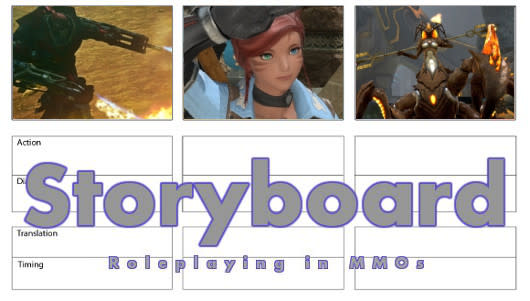Storyboard: Skipping scenes
There are certain bits of roleplaying that I like to think of as mechanical. They're there, they're necessary, but they're not terribly interesting. They're like random battles in Bravely Default: kind of neat the first time, altogether forgettable all subsequent times, and never blessed with an abundance of fascinating stuff. You need to get through them, but you can't really look forward to them any more than you can look forward to the most routine-filled parts of your day.
So the best bet is to say they happened without acting them out.
Yes, I'm saying there are bits of roleplaying that are best acted out only in reference. And I'm not just talking about your characters' bathroom visits; I'm talking about things like dates and shared experiences. So when is it actually an advantage to roleplay by not actually roleplaying at all? How do you determine the scenes that you know happened and are important but aren't important enough for you to actually play them out?

The scene is relevant only now
One of the things we accept as a tacit fact is that we are not roleplaying our characters at all times. Even if you're in-character every moment that you're in game, you're not in-game all day every day. You have to get up to go to the bathroom, eat dinner, do shopping, do your job, and so forth. There are times when you aren't roleplaying, simply enough.
That means that by definition, the parts you're roleplaying are the highlights of your character's life, which means that there are probably a lot of other things that happened between characters when you weren't playing them that would make perfect sense.
Obviously, these are things you need to discuss with the people you're playing with. I've had many people ask me if it's all right if they filled in some bit of character interaction that reasonably happened in the past but didn't happen "on-screen." But it's also a good way to get to the meat of a scene without getting bogged down in technicalities.
This is especially true if the event you're referencing is mostly important because of how it informs what's happening right now. My main character in Final Fantasy XIV, for instance, has years of history with some of my wife's characters, much of which predates the game's setting. Filling in those details allows for a much richer experience. Rather than stopping roleplaying to go back and fill in the details, you're much better off to just keep rolling along and accept that yes, something happened in the past.
The scene would make someone uncomfortable
I've talked in the past about trying your best to avoid making other players uncomfortable, and usually, that's accomplished by just not going to uncomfortable places. But sometimes you can agree that uncomfortable places are the right places for a scene to go... even if you really don't want to see any more of it yourself.
No, this isn't limited to trigger subjects. The obvious example is when two characters are obviously about to share some time between the sheets. It's possible -- likely, even -- that the two players don't have any chemistry and aren't interested in necessarily roleplaying that out. Yes, you agree that they did something, but you don't want to go into detail. So you fade to black and pick up at a later point, agreeing on what happened without going into any (ahem) blow-by-blow recounting.
Everyone has a different level of comfort with things, and it's important that you give people outs. Even out of the realm of ERP, there are personal triggers you won't know about, personal feelings you wouldn't have reason to hear of before roleplaying starts circling shark-infested waters. It's all right to say "we don't need to play that out" when you're both in agreement about the what. Details are relevant only if you make them so.

The scene is better in reference
I'm not going to link to TVtropes here (you're welcome) because you can go searching if you want to, but one of the many tropes contained therein is the Noodle Incident. The name comes from a long-running gag in Calvin & Hobbes in which the eponymous noodle incident is referenced, but never explained. It's obvious that something happened, but the details of it are left to the reader because the reality can't be as entertaining as the possibilities.
Having a few Noodle Incidents in your own history can be great. Not as major dramatic plot points -- you want to know what happened to your character if it's going to be super-relevant. But you can always say, for example, that your character isn't welcome in a city due to an "incident." What was the incident? What happened? Was anyone hurt?
It doesn't matter. As long as you keep the details vague and irrelevant, people will fill in the rest. The important thing is just planting the seed.
Obviously, scenes like this can't be roleplayed out because the whole point is that they aren't detailed. This can be a lot of great fun with two characters who have known each other for a long time; I've had long sequences with other players riffing off of a single shared fact and alluding to events while never mentioning details. Leaving room to be vague isn't a bad thing all the time.
The scene would be boring
One of the best pieces of writing advice I ever got from a roundabout source was to cut out the boring parts of the story. Are your characters on a three-week voyage? Does anything interesting happen during those three weeks? If not, jump ahead. If one thing does, jump to that. You don't need to show it; you can just jump to the next interesting point and continue from there.
This is also true of roleplaying. Is a group of characters traveling from one place to another? If nothing interesting will happen between those points, break out your fastest travel modes and dart over. Are your characters going to sleep and you want to see what happens in the morning? Jump to when they wake up. Don't worry about skipping the boring parts because those aren't fun anyway.
Just skip to the next interesting part. It's what you'd do if you were watching at home.
You can feel free to leave feedback down below or mail it along to eliot@massively.com, as you'd prefer. Next week, let's talk about manipulation. The week after that? Pets.

Every Friday, Eliot Lefebvre fills a column up with excellent advice on investing money, writing award-winning novels, and being elected to public office. Then he removes all of that, and you're left with Storyboard, which focuses on roleplaying in MMOs. It won't help you get elected, but it will help you pretend you did. If you need a refresher, check out the Storyboard Library.


